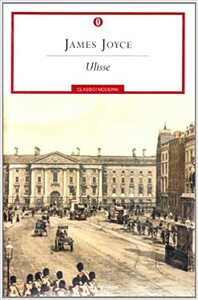Take a photo of a barcode or cover
I read Ulysses in college as a lark. The book's mood and seeing hung around me like a cloud. The very air of it invaded my thoughts -- expanding them from the inside. I was a biochemistry student at the time, but I began to see and experience other things, other worlds outside as well as worlds inside me.
Recently, on a long drive to help a friend, I listened to it again. It was like a mind blowing drug, a trip through another's brain. More than once, I had to turn it off to focus on driving.
I don't know what it is about this book. All of the criticisms are accurate. It's pretentious. It's boring by today's action standards. It's long, too long. It makes no sense.
To me, it's deeply experiential, and, in that, specifically existential. It has had a huge impact on my life and writing as it focused me on the character's internal experience. It reminds me to slow down, write moment to moment, and feel, just feel, what my character is feeling.
One more thing, I found a set of Joyce's letters in a used bookstore. In the volume written at the time he was writing this book, you will find him experiencing many of the same events, described in clearer language. I saw how he translated experience from exposition to sense experience on the page. Fabulous and fascinating. If you want a companion to this book, get those.
Recently, on a long drive to help a friend, I listened to it again. It was like a mind blowing drug, a trip through another's brain. More than once, I had to turn it off to focus on driving.
I don't know what it is about this book. All of the criticisms are accurate. It's pretentious. It's boring by today's action standards. It's long, too long. It makes no sense.
To me, it's deeply experiential, and, in that, specifically existential. It has had a huge impact on my life and writing as it focused me on the character's internal experience. It reminds me to slow down, write moment to moment, and feel, just feel, what my character is feeling.
One more thing, I found a set of Joyce's letters in a used bookstore. In the volume written at the time he was writing this book, you will find him experiencing many of the same events, described in clearer language. I saw how he translated experience from exposition to sense experience on the page. Fabulous and fascinating. If you want a companion to this book, get those.
challenging
slow-paced
Guys I tried so hard but you could spend an entire PhD on this book and still have more to say about it, so much complexity. Instead of library loan, I need to buy a copy so that I can read a little at a time over the course of years like a Bible
I respect that this book exists, but I didn't enjoy reading it. And that's okay! Accepting that it's a work of experimental fiction means accepting that the experiment might fail for some readers.
But I kind of don't know where to begin. What am I reviewing? Joyce's ability to cram wordplay and references to religion and psychology and history into punishingly-formatted swaths of text? He can definitely do that. Can he do all that and still produce a satisfying story? Maybe, but not in this book. This book is an irritating, obnoxious slog. That's my subjective opinion.
Maybe the point of the experiment wasn't to tell a satisfying story. But then, what was it? You can't say it's a radical experiment with form and then do nothing but take form to its extremes. You have to be testing whether you can do that and still produce something that respects your reader's attention. Right? I mean, I guess you can do anything, but am I supposed to pretend you succeeded in an experiment without a goal?
My feeling was that the author had an active disdain for the reader. I was disappointed to find this book reeking of proto-edgelord shit. I suspect, unfortunately, that the goal of the experiment was to provoke "a response." If I roll my eyes at its off-the-charts pretentiousness, then it got me. Okay! If the mere fact that I am annoyed means the experiment was a success, I think that is not an interesting experiment.
Really, I felt like Joyce wanted to engage in a battle of wills with me. I finished it because I'm very stubborn. I can, unfortunately, put up with almost infinite levels of smart boy fart-huffing. He compares himself to Shakespeare, but the thing about Shakespeare is that on top of all the deeper levels of language play, he was still delivering the surface-level art of a satisfying story. Ulysses fails on the surface level—scoffs at the mere idea that it should care about storytelling—and thinks its overwrought innards are enough to justify the comparison. Woof.
I respect this book's place in the history of literature, and I'm glad it triumphed in the end over the multitude of attempts to suppress its printing on obscenity grounds. But, like, it's not good. To read. I am so sorry. I really wanted to appreciate this book the way so many people do, and I guess I reserve the right to change my mind about it someday, maybe when I feel less exhausted by its obvious needy desperation to be praised as a work of genius. All I have for it right now is a weary pat on the head. Good for you, James Joyce. Yes, you're very special.
But I kind of don't know where to begin. What am I reviewing? Joyce's ability to cram wordplay and references to religion and psychology and history into punishingly-formatted swaths of text? He can definitely do that. Can he do all that and still produce a satisfying story? Maybe, but not in this book. This book is an irritating, obnoxious slog. That's my subjective opinion.
Maybe the point of the experiment wasn't to tell a satisfying story. But then, what was it? You can't say it's a radical experiment with form and then do nothing but take form to its extremes. You have to be testing whether you can do that and still produce something that respects your reader's attention. Right? I mean, I guess you can do anything, but am I supposed to pretend you succeeded in an experiment without a goal?
My feeling was that the author had an active disdain for the reader. I was disappointed to find this book reeking of proto-edgelord shit. I suspect, unfortunately, that the goal of the experiment was to provoke "a response." If I roll my eyes at its off-the-charts pretentiousness, then it got me. Okay! If the mere fact that I am annoyed means the experiment was a success, I think that is not an interesting experiment.
Really, I felt like Joyce wanted to engage in a battle of wills with me. I finished it because I'm very stubborn. I can, unfortunately, put up with almost infinite levels of smart boy fart-huffing. He compares himself to Shakespeare, but the thing about Shakespeare is that on top of all the deeper levels of language play, he was still delivering the surface-level art of a satisfying story. Ulysses fails on the surface level—scoffs at the mere idea that it should care about storytelling—and thinks its overwrought innards are enough to justify the comparison. Woof.
I respect this book's place in the history of literature, and I'm glad it triumphed in the end over the multitude of attempts to suppress its printing on obscenity grounds. But, like, it's not good. To read. I am so sorry. I really wanted to appreciate this book the way so many people do, and I guess I reserve the right to change my mind about it someday, maybe when I feel less exhausted by its obvious needy desperation to be praised as a work of genius. All I have for it right now is a weary pat on the head. Good for you, James Joyce. Yes, you're very special.
Joyce packed his "chaffering and allincluding most farraginous chronicle" with so much stuff that it's not surprising to find in the Circe episode a review of his own book, which I submit in lieu of my inevitably inadequate attempt:
BIDDY THE CLAP: He expresses himself with much marked refinement of phraseology.
CUNTY KATE: Indeed, yes. And at the same time with such apposite trenchancy.
And there you have it.
BIDDY THE CLAP: He expresses himself with much marked refinement of phraseology.
CUNTY KATE: Indeed, yes. And at the same time with such apposite trenchancy.
And there you have it.
Well I did the thing and I read THE book and it only took me one (1!) whole semester with a class devoted to studying it. I will post a full review another day, another night, when I can properly compile my thoughts (and I have oh so many thoughts). All I have to say for the moment is (notably) YES! ("yes I said yes I will Yes").
It's a very mixed book. It could really do with a good, hard edit. Some of the chapters are much better than others. I actually did
read every word this time and it was worth doing, and I'm glad I did it. Some of the sections are really hard going, though, for very little reward.
The good bits are fantastically good, though. The 'wandering rocks' chapter, for instance, which follows characters all over Dublin at the same time, is a culmination of the work of a master short story writer. Molly's chapter, the last chapter, is a real treat. I love the way Bloom's internal dialogue is written in chapter 4, too. And naughty Gerty on the beach narrating her life to herself as though it were a romance novel is fun, too. There are some funny moments and lots of interesting linguistic experiments.
However, a lot of the experiments don't work and should have been ditched before final publication. The hospital chapter, for instance, is supposed to be related through a pastiche of the history of English literature, but it's just a barely decipherable mess. The library chapter has a few interesting moments but, like most undergraduate chatter, is a lot less interesting and clever than it thinks it is. Grow ups shouldn't have to sit through the whole thing. The catechism/ exam paper is a nice device, but it goes on too long.
I know we are all supposed to be appalled that such a work of genius was originally banned by our philistine forebears for obscenity, but it actually is obscene. Not just Bloom farting and using the privy, not just the inclusion of prostitutes, allusions to masturbation, or Molly's affair. There are explicit descriptions of minority interest sexual acts. I wasn't disgusted, but it wasn't pleasant to read either. I'm not sure that I understood it all when I read it first as a student. So I guess that's in its defence against charges of obscenity: if you don't know about something you won't find out about it here because you won't understand what's being described. When I first read it, of course, I thought Stephen and his friends were being terribly interesting and witty in the library, too.
I know Joyce said it had taken him 7 years to write this book so readers should spend just as long on it, but I'm rather pleased that it only took me about 4 months. I couldn't have kept with it if I hadn't read other things over that time. I think maybe Joyce could have wisely invested another year or so working with a good editor to make some of it less of a chore.
Three stars because there are 5 star sections and 1 star sections and everything in between.
read every word this time and it was worth doing, and I'm glad I did it. Some of the sections are really hard going, though, for very little reward.
The good bits are fantastically good, though. The 'wandering rocks' chapter, for instance, which follows characters all over Dublin at the same time, is a culmination of the work of a master short story writer. Molly's chapter, the last chapter, is a real treat. I love the way Bloom's internal dialogue is written in chapter 4, too. And naughty Gerty on the beach narrating her life to herself as though it were a romance novel is fun, too. There are some funny moments and lots of interesting linguistic experiments.
However, a lot of the experiments don't work and should have been ditched before final publication. The hospital chapter, for instance, is supposed to be related through a pastiche of the history of English literature, but it's just a barely decipherable mess. The library chapter has a few interesting moments but, like most undergraduate chatter, is a lot less interesting and clever than it thinks it is. Grow ups shouldn't have to sit through the whole thing. The catechism/ exam paper is a nice device, but it goes on too long.
I know we are all supposed to be appalled that such a work of genius was originally banned by our philistine forebears for obscenity, but it actually is obscene. Not just Bloom farting and using the privy, not just the inclusion of prostitutes, allusions to masturbation, or Molly's affair. There are explicit descriptions of minority interest sexual acts. I wasn't disgusted, but it wasn't pleasant to read either. I'm not sure that I understood it all when I read it first as a student. So I guess that's in its defence against charges of obscenity: if you don't know about something you won't find out about it here because you won't understand what's being described. When I first read it, of course, I thought Stephen and his friends were being terribly interesting and witty in the library, too.
I know Joyce said it had taken him 7 years to write this book so readers should spend just as long on it, but I'm rather pleased that it only took me about 4 months. I couldn't have kept with it if I hadn't read other things over that time. I think maybe Joyce could have wisely invested another year or so working with a good editor to make some of it less of a chore.
Three stars because there are 5 star sections and 1 star sections and everything in between.
challenging
dark
slow-paced
Plot or Character Driven:
A mix
Strong character development:
No
Loveable characters:
No
Diverse cast of characters:
No
Flaws of characters a main focus:
Complicated
I honestly didn't get this book at all. It was too confusing for me. I had to read chapter synopses of the book before or after I read a chapter (it was even hard to tell where the chapters ended and started). There was a middle section that was written like a play and then the last section there were hardly any breaks or punctuation, which made the book seem awfully long. I only kept on reading this book because it is on a book poster that I have and I want to finish reading all of the books on that poster. I watched some YouTube videos on reading this and I think that you really have to invest time into understanding this book to appreciate it. It was definitely not a favorite classic of mine.
challenging
emotional
funny
hopeful
slow-paced
Plot or Character Driven:
Character
Strong character development:
Complicated
Loveable characters:
Complicated
Diverse cast of characters:
Complicated
Flaws of characters a main focus:
Complicated
I understand why this book holds the place as Time's number 1 book the writing is experimental and there were certainly parts of the novel that I was fully intrigued and amazed by. However, overall Joyce and I are no longer friends after this book. It was quite a struggle to finish







